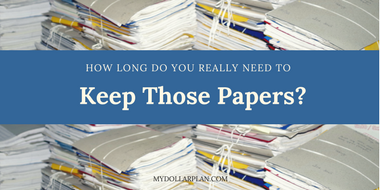How Long Do You Really Need to Keep Those Papers?

How long do you need to keep records? When we don’t know how long to keep something, we end up keeping it forever… or not at all.
Being organized is not the same thing as keeping all papers and financial records forever!
How long do you need to keep bank statements? How long do you need to keep tax records? What about all the copies of paper checks after they were deposited?
How Long Do You Need to Keep Records?
It’s time to take the paper trail and purge all the extra records you don’t need anymore! Here’s how long we should be keeping those important papers:

Forever
- Birth Certificates
- Marriage Certificates
- Divorce Certificates
- Death Certificates
- Military Documents
- Immunization Record
- Employment Records (Why)
- IRA Contributions (Why)
- Social Security Card
- Tax Returns: The IRS can audit your returns from 3 years ago; 6 years if you grossly under reported; indefinitely if you filed a fraudulent return or did not file. So you could pitch your returns after 7 years… however, if they claim you didn’t file, and you pitched it… well, now you know why I put tax returns on the indefinite list! You can also request copies or transcripts of past tax returns. For more details on how long to keep tax records, see the specifics on how long to keep tax returns below.
Keep During Ownership
- Car Titles and Service Records
- Receipts, Manuals, and Warranty Information for Appliances
- Receipts for Major Purchases like Jewelry, Furniture, and Computers
Ownership Plus 7 Years
Even after you sell investments or real estate, you’ll still need to keep the gain or loss documentation for tax purposes.
- Stocks, Bonds, and Investment Records
- Savings Certificates
- Home Improvement Documentation
- Real Estate Records
7 Years
Many of the following will contain information that supports tax returns. Therefore it’s best to keep the following for seven years:
- Canceled Checks
- Credit Card Statements
- Old Bank Statements
- Retirement Plan Contributions
- Supporting Documentation for Tax Returns
Until Specified Date
- Annual Retirement Statements: Until retirement and funds are exhausted.
- Insurance Policies – Until property is sold, policy expires, and all claims are settled.
- Wills: Until replaced by a new one.
Throw Away
- Receipts not used for Warranties, Taxes, or Insurance
- Paycheck Stubs: Once you get your W-2, you can toss them
- Phone Bills not needed for taxes
- ATM Receipts
- Grocery Receipts
How Long Do You Need to Keep Tax Records?
Special rules exist when it comes to your tax records. According to the IRS, here are the guidelines on how long to keep tax records:
Keep Tax Returns Forever
- If you filed a fraudulent return, keep your tax returns forever.
- If you did not file a return, keep your tax records forever.
Keep Tax Returns for 7 Years
- If you claimed a worthless security loss or deducted a bad debt, keep your tax records for 7 years.
Keep Tax Returns for 6 Years
- If you grossly underreported your taxable income (more than 25% of the gross income on your return), keep your tax return for 6 years.
Keep Tax Returns for 3 Years
- If the above don’t apply, keep your tax returns for 3 years.
- If you filed an amended tax return, keep your tax return for 3 years or 2 years from when you paid the tax if it’s later.
Other Tax Records to Keep
In addition to keeping your tax return, you’ll also need to keep information that supports those tax returns including:
- Canceled Checks
- Credit Card Statements
- Old Bank Statements
- Retirement Plan Contributions
More Ways to Get Organized
- Quicken: The Personal Finance Tool I Use Everyday
- 6 Ways to Make Money Organizing Your Clutter
- Turn Your Spring Cleaning into Extra Cash
- 22 Ways to Eliminate Financial Clutter
- 8 Easy Ways to Organize and Simplify Your Bills
- Tackle Your Financial Clutter in 10 Minutes Today
- How to Handle an Income Tax Audit
- Are Automatic Payments Secretly Costing You Money?





Though companies offering retirement plans are now in the minority, if one has ever been employed via a company providing a “defined pension plan” & departed prior to taking retirement (even after having worked as little as 5 years), you may need proof of employment, obtainable only via those W-2’s to provide proof of employment. WHY? Records often get lost, sent to storage/warehouse, so no record available on your employment. WHEN CAN YOU COLLECT? Generally @ 59 1/2, 62, 65 – check with Employee/Human Relations dept.
@ Sadie: Thanks for the reminder on the defined benefit plans!
Madison, consider the number of “young employees”, who spent just a few years at many of the major companies providing defined benefit plans which promised “vested benefits” and the employees either never recognized or forgot benefits available to them in their old age or if they remembered had difficulty proving their work history.
It took about 4 yrs to obtain vested benefits for hubby; as he was not a long-timer & though minimal rec’d monthly, over 10 yr period certainly adds up. Fortunately I still had
W-2 records from 30+ yrs ago plus an executive who verified his employment.
SAVE THOSE W-2 RECORDS if applicable to you & don’t give up!
there is a difference between retaining actual documents and copies. marriage certificates, titles, birth certificates, etc you need to retain permanently because copies aren’t legal for those. however, having an electronic copy pdf and printing if the original is lost or destroyed helps to get one quicker. the other stuff takes no effort or space or clutter if you scan and save electronically.
I’ve actually gone paperless with most of my bills.
Sadly, credit card companies still have to send a paper copy, which is annoying.
I’m considering scanning all my paper records … just getting tired of the paper.
While my comment is slightly off topic, since it is tax time the length of time to save tax records caught my eye. I was reminded of some advice I got not too long ago from my tax guy:
If you are ever audited, the audit will be for a specific tax year. During an audit, NEVER hand over tax records to the IRS for any year other than the specific year they are auditing you for (even if you have those records). Example: If you are being audited for your 2007 return, and they want to see information on your 2006 return, they are required by law to audit you for 2006 as well. Otherwise, a polite no will do the trick and is your legal right.
What Phil said.
If the audit notice specifies items on your 2007 return, it will then state at the bottom something to the effect of “please bring 2005 & 2006 returns as well” – essentially any return still in the 3 year limit.
EVERY audit book I’ve read tells you to “forget” to bring returns for prior years when they do not have items specifically under audit.
Those books note the auditor does not have easy access to returns not specifically under audit – so don’t make it easy for them to go on a “fishing expedition”
BTW, it is rare to go beyond the 3 year limit since that requires underreporting income more than 25% – that’s a difficult burden of proof for the IRS to meet.
You have classified the documents well. I follow your classification quite closely. On the 7 years and ownership + 7 years things, I try to keep the reference numbers. I presume (have yet to be tested) that the companies should have the records and better storage facilities.
Regards
keep your records as long as you can ..i just got nailed for embezzlement because I do not relate records from 1999
hello question my husband brought me a diamond watch and ring from this well known jewelry store my husband dies 2 1/2 years ago in may sum1 breaks n our home and steals me jewlery store tell me they cant help my in retaining the proff off sale i thought a business is suppose to keep proff of sale or sale invoices helpppp
I really need to work on this as I’m one of those that keep a lot of papers.